Patrick DeCorla-Souza, Tolling and Pricing Program Manager, FHWA
Lee Munnich, Humphrey Institute, University of Minnesota
Kenneth Buckeye, Minnesota Department of Transportation
John Doan, SRF Consulting
Center for Innovative Finance Support
Federal Highway Administration
First Part of a Webinar Series on Road Pricing Outreach
FHWA - Center for Innovative Finance Support Road Pricing Public Acceptance and Outreach Webinar Mini-Courses
Moderator:
- John Doan, SRF Consulting
Presenters:
- Patrick Decorla-Souza, Tolling and Pricing Manager, FHWA
- Lee Munnich, Humphrey Institute, University of Minnesota
- Kenneth Buckeye, Minnesota Department of Transportation
- John Doan, SRF Consulting
Audience Q&A:
- Type questions into the chat box. The moderator will field your question to the appropriate panelist. Questions will be answered at the end of each session and during the last 15 minutes of the webinar.
Presentation Outline
- Key factors that have led to public acceptance of road pricing in the U.S. (Patrick DeCorla-Souza)
- A grasstops approach to outreach and communications (Lee Munnich)
- Minnesota experience (Ken Buckeye)
- Group Discussion and Preparation for Next Session (John Doan)
Part 1 Key factors that have led to public acceptance of road pricing in the U.S.
Patrick DeCorla-Souza,
Tolling and Pricing Program Manager,
FHWA
Types of Congestion Pricing
- Priced lanes: High-Occupancy/Toll (HOT) or Express Toll lanes
- Priced highways: Variable tolls on toll facilities or on existing free roads
- Priced zones: Area or cordon
- Fully priced road networks: Commercial vehicles or all vehicles
Priced Lanes: HOT Lanes
San Diego, I-15:
- Choice not to pay
- No lane "take-away"
- Most of net revenue allocated to transit
Priced Lanes: Express Toll lanes
SR 91, Orange County, CA:
- Choice not to pay
- Only new lanes tolled
- Discount for high-occupancy vehicles
Priced Highways
SR 520 Bridge, Seattle:
- Key factors:
- High cost of bridge replacement
- Lack of tax-based funding.
- Public understanding of the above
Cordon Pricing
New York City proposal:
- Key factors:
- Understanding of the economic cost of congestion ($13 B annually)
- Revenue generation for transit infrastructure ($500 million annually)
- Mitigation of negative impacts
Fully Priced Road Networks
- Pilot test:
New York State
|
- Pilot tests: Oregon, Seattle, Minnesota, Atlanta, and 12 other cities (VMT fee demonstration)
- Metropolitan area model-based studies
|
Metropolitan Area Study: Seattle, WA
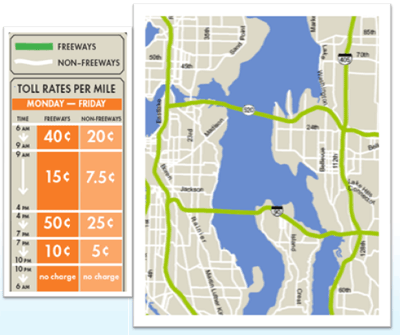
Seattle Study: Finance
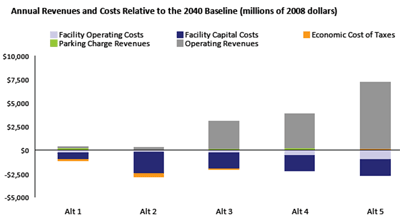
Seattle Study: Emissions
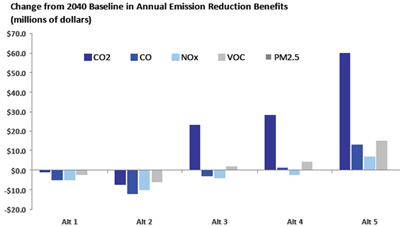
Seattle: Benefits vs. Costs
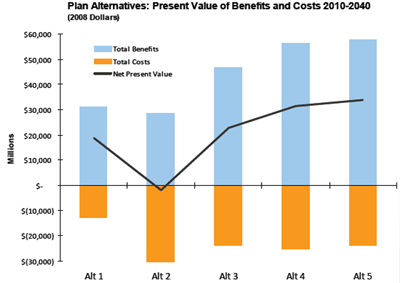
Effectiveness vs. Acceptance
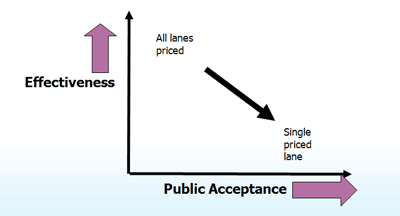
Public Acceptance: Opinion Surveys
- Priced Lanes:
- About 70% approval from all income groups
- Priced Highways:
- Seattle: 64% approval for new tolls on SR 520 bridge
- Priced Zones:
- New York City: 40% approval, rising to 59% if the revenue were used for expanded transit service
- Priced Highway Network:
- Seattle's MPO has adopted full pricing of its network of limited access facilities in its Long Range Transportation Plan, with a 98% vote.
Addressing Equity Concerns
- Income-based equity:
- Toll credits, discounts or reimbursements
- Benefit-based equity:
- Congestion relief and physical infrastructure improvements
- Modal Equity:
- Provide toll exemptions and dedicate some of toll revenue to alternative modes
- Geographic equity:
- Region-wide approach vs. project-by-project approach
Addressing Public Perceptions
Doubts about effectiveness |
Pilot tests, subject to referendum |
Travel alternatives, traffic diversion |
Enhanced alternative modes, enhanced signal coordination on parallel free arterials |
Paying twice |
Engage public in debate on true costs of infrastructure and funding from taxes |
Cost of toll collection |
Collecting taxes is less expensive, but does not provide the same benefits |
| Privacy |
Legislative safeguards, anonymity of account information, electronic purse |
Credibility and trust of government agencies or elected bodies |
Money-back guarantee
Dedicated use of revenue
Identify the specific projects on which the revenues will be expended |
Part 2 - A Grasstops Approach to Road Pricing Outreach and Communications
Lee Munnich, Humphrey Institute,
University of Minnesota
Outreach and Communications Process
- Market research - understanding
- Education - learning
- Outreach - involving
- Communication - explaining
- Marketing - selling
- Evaluation - confirming
Grasstops Approach
- Get the Governor on board
- Engage legislative champions
- Keep it bipartisan
- Take your show on the road
- Take policy leaders on the road
- Look for media opportunities
- Leave no question behind
Part 3 - Road Pricing Public Acceptance and Outreach
I-394 MnPASS Case Study
Kenneth R. Buckeye, AICP
Value Pricing Program Manager
Minnesota Department of Transportation
I-394 MnPASS Express Lanes
- Brief History
- Project Description & Goals
- Driving Forces
- Public Acceptance Issues
- Public Involvement
- Performance
- Satisfaction Levels
- Lessons Learned
- Related NCHRP Projects
A Brief History of Tolling in Minnesota
- 1993 Public-Private Partnership Law
- 1995 TranSmart tolling initiative
- 1997 Minnesota Road Pricing Study
- 1997 First attempt at MnPASS
- 1998-2002 Value Pricing Policy Debate
- 2003 HOV to HOT Conversion Legislation
- 2005 I-394 MnPASS launched
- 2009 I-35W MnPASS launched
I-394 MnPASS Goals
- Improve I-394 efficiency
- Maintain free flow speeds for transit and carpoolers
- Use revenues to improve highway and transit in corridor
- Employ new technologies for pricing and enforcement
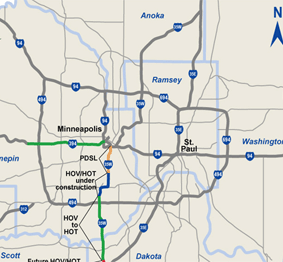
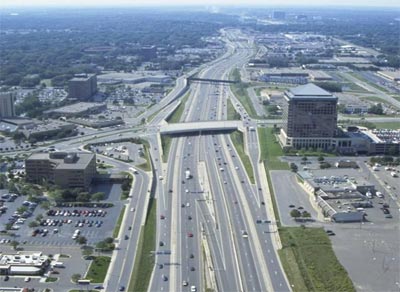
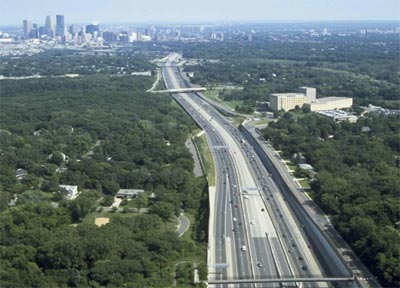
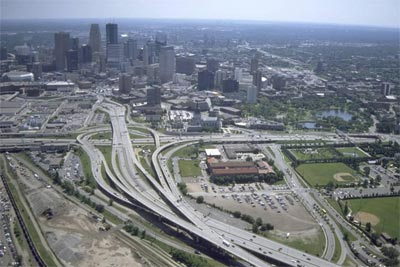
MnPASS Driving Forces
- Congestion
- 150,000 ADT
- Perception of under used lane
- Expansion or conversion not feasible
- Must manage system better
- Influence of other successful projects
- Outreach and education: Value Pricing Advisory Task Force
- Political leadership emerged
- Value Pricing Pilot Program
Public Acceptance Issues
- Public acceptance is by far the biggest challenge
- Minnesotans are toll averse
- Concerns
- Equity
- Double taxation
- Performance
- Toll booths!
- Diminish level of service for transit
- What is variable (dynamic) pricing
Public Involvement
- Collaboration: MnDOT, FHWA, Met Council, Univ. of Minnesota
- Value Pricing Advisory Task Force
- I-394 Corridor Implementation Task Force
- Advise Commissioner of Transportation on:
- Hours of Operation
- Transponder
- Safety and Enforcement
- Toll Rates
- Dynamic Message Signs
- Public Outreach
- Expected Revenues
- Project Evaluation
- Type of Vehicles Allowed
- Access Points/Traffic Operations
- Outreach and education
- Clearly articulate objectives
- Visit projects
- Framing solution: choice; use of revenue
- Build trust and expertise
- Provide ample opportunity for pubic input
- Answer every question!
- Conduct market research
- Make changes to project if necessary
- Pro-active communications and marketing
- Final report available online at http://www.dot.state.mn.us/mnpass/
I-394 MnPASS Performance
- Dynamic pricing works
- I-394 MnPASS lanes peak hour volumes increased 9 to 33%
- Total I-394 peak hour roadway volumes increased by up to 5%
- 98% of time speeds above 50 mph
- Travel speeds in the general purpose lanes increased by 2 to 15 %
- Transit ridership and carpools levels increase
- Safety has not been compromised
- Enforcement has been effective
MnPASS Acceptance by Income
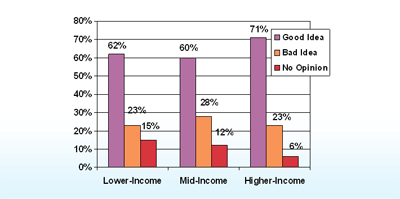
Satisfaction Among All MnPASS Lane Users
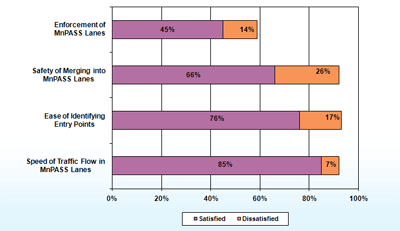
Comparison of MnPASS Corridors
| |
I-394 |
I-35W |
| Regional Support |
Weak |
Strong |
| Legislative Comparison |
Cautious |
Supportive |
| Public Perceptions |
Negative, a very high level of engagement |
Accepting, low level of engagement |
| Framing the Problem |
Underperforming lane, high violations, must preserve HOV and Transit LOS, choice option |
Underperforming lane and corridor, high violations, PDSL necessary for lane continuity, transit enhancements |
| Agency Support |
Weak to moderate |
Strong |
| EJ and Equity |
No issues |
No Issues |
I-394 MnPASS Meeting its Goals
- Significantly reduces congestion and increases safety
- Non-barrier separated access is safe and reduces infrastructure requirements
- Dynamic pricing and technology works
- Free flow speeds maintained
- Lower violation rates
- Customers are highly satisfied and are getting value for their toll dollars
- Revenues meeting operating costs
MnPASS Lessons Learned
- Political leadership is essential
- Public will support projects if they can see benefits
- Choice to pay to avoid congestion
- No reduction in LOS for transit and carpools
- Safety has been improved
- Put the market to work
- Sustainable
- HOT lanes are not a revenue generator
- Effective outreach, education and marketing are critical for success
- Pricing projects are more likely to generate support if linked to transit improvements
- Nothing succeeds like success!
Related NCHRP Projects - trb.org/NCHR
- 20-5 Synthesis Project 377 Compilation of Public Opinion Data on Tolls and Road Pricing
- 08-36 Task 93: Road Pricing Communications Practices (complete)
- 08-57 Toll Decision Model and Forecasting Tool (complete)
- 08-73 Road Pricing Public Perceptions and Program Development (Draft report)
- 08-75 (Guidelines for Evaluation and Performance Measurement of Congestion Pricing Projects (Draft report)
Part 4 - Group Discussion and Preparation for Next Session
John Doan - SRF Consulting
For More Information
- FHWA Center for Innovative Finance Support :
www.fhwa.dot.gov/ipd
- FHWA Office of Operations:
https://ops.fhwa.dot.gov/tolling
pricing/
- Webinar Mini-Courses:
http://regionalities.hhh.umn.edu/
Contact Information
- Patrick DeCorla-Souza
Tolling and Pricing Program Manager
Center for Innovative Finance Support
Federal Highway Administration
Department of Transportation
1200 New Jersey Ave, SE
Washington, DC 20590
(202) 366-4076
Patrick.DeCorla-Souza@dot.gov
- Lee Munnich
Senior Fellow and Director
State and Local Policy Program/Hubert H. Humphrey Institute of Public Affairs
280 Humphrey Center
301 19th Avenue South
Minneapolis, MN 55455
(612) 625-7357
lmunnich@umn.edu
- Kenneth Buckeye
Program Manager
Minnesota Department of Transportation
395 John Ireland Blvd
MS 330
St. Paul, MN 55155
(651) 296-1606
kenneth.buckeye@dot.state.mn.us
- John Doan
Senior Associate
SRF Consulting Group, Inc.
1 Carlson Parkway, Suite 150
Minneapolis, MN 55447
(763) 249-6750
jdoan@srfconsulting.com
What's Next?
- Session 2: Seeking Approval - Lessons from PLANYC 2030 Congestion Pricing
- September 7, 2:00-3:30PM EDT
- Presenters: Bruce Schaller (NYCDOT), Lee Munnich (Humphrey Institute), John Doan (SRF Consulting)
- Session 3: Integration with the Planning Process and Outreach Strategies for Project Deployment
- September 28, 2:00-3:30PM EDT
- Presenters: Charlie Howard (PSRC), Patty Rubstello (WSDOT), Rob Fellows (WSDOT), Patrick DeCorla-Souza (FHWA), Wayne Berman (FHWA), John Doan (SRF Consulting)
- Registration and more information: http://regionalities.hhh.umn.edu/










